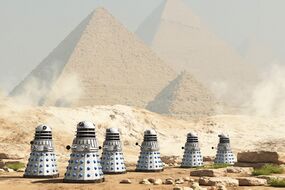Great Pyramid of Giza: Difference between revisions
No edit summary Tag: 2017 source edit |
Tag: 2017 source edit |
||
| Line 14: | Line 14: | ||
== History == | == History == | ||
[[File:Daleks at Giza.jpg|thumb|A Dalek patrol in the shadow of the Great Pyramid at Giza. ([[PROSE]]: ''[[Dalek: The Astounding Untold History of the Greatest Enemies of the Universe (short story)|Dalek: The Astounding Untold History of the Greatest Enemies of the Universe]]'')]] | |||
[[Scaroth]] insisted that he had "quite a lot to do with the building of the pyramids", through the Doctor considered Scaroth "rather full of himself" and believed it may have been "wild exaggeration". ([[PROSE]]: ''[[A History of Humankind (novel)|A History of Humankind]]'') | [[Scaroth]] insisted that he had "quite a lot to do with the building of the pyramids", through the Doctor considered Scaroth "rather full of himself" and believed it may have been "wild exaggeration". ([[PROSE]]: ''[[A History of Humankind (novel)|A History of Humankind]]'') | ||
Revision as of 11:42, 17 October 2022
The Great Pyramid of Giza, sometimes known as the Great Pyramid of Cheops or of Khufu, was a pyramid in Giza, Egypt, once considered one of the Seven Wonders of the World. It housed the tomb of the Pharaoh Khufu. (COMIC: Minus Seven Wonders) It was the only one of the Seven Wonders of the Ancient World which remained intact by the early 21st century. The Great Pyramid stood at 140 metres tall and took 20 years to build. The Twelfth Doctor noted that it also took a lot of slaves. (PROSE: A History of Humankind)
History

Scaroth insisted that he had "quite a lot to do with the building of the pyramids", through the Doctor considered Scaroth "rather full of himself" and believed it may have been "wild exaggeration". (PROSE: A History of Humankind)
At the time of its erection, its surroundings were the set of an engagement between the First Doctor, the Monk and the Daleks. At the "west angle of the Great Pyramid", Steve and Sara, hostages of the Daleks, were released in exchange for the taranium core. (TV: The Daleks' Master Plan)
When the Tenth Doctor brought Martha Jones to see it in 2375 BC, it was stolen by Pholonius Ginn, who intended on selling it to the highest bidder on G-Bay. It was finally returned — with the other six Wonders — by Trongus Squum, at the Doctor's request. (COMIC: Minus Seven Wonders)
The Sixth Doctor and Evelyn Smythe visited the Great Pyramid looking for signs of a Dalek in Earth's history. (PROSE: The Eighth Wonder of the World)
The Fifth Doctor and Erimem saw the Great Pyramid while approaching Giza. (AUDIO: The Eye of the Scorpion)
Napoléon Bonaparte visited the Great Pyramid in 1798. (PROSE: The Sands of Time)
On 5 November 1967, the Revolution Man carved his symbol on the face of the Great Pyramid. (PROSE: Revolution Man)
Alternate timelines
It was the place where the timey-wimey distress beacon was built by River Song in an alternate timeline where all of history occurred at once. The timeline came into being because she refused to kill the Eleventh Doctor. The King's Chamber was where they had Madame Kovarian tied up. River was married to the Doctor on the top of the pyramid and she kissed him — actually the Teselecta — reverting the timeline. (TV: The Wedding of River Song)
References
Clara Oswald had a travel guide to the Great Pyramid of Giza in her collection. (TV: Dark Water)
Behind the scenes
- According to Strange to Tell... According to the Daleks (a comic from The Dalek World which, due to not having a plot to speak of, is not considered a valid source on this Wiki), the Great Pyramid of Ghiza was constructed in the year 2000 B.C. by terrified Egyptians to mark the spot where a Dalek spacecraft had crashed.
